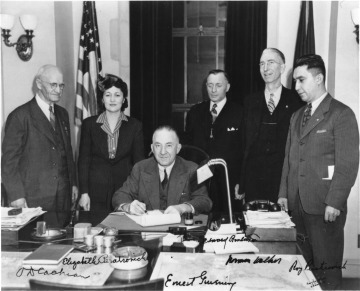1945: Alaska’s territorial legislature adopts anti-discrimination law
Elizabeth Peratrovich, president of the Alaska Native Sisterhood, testifies before the Alaska Territorial Legislature as it debates anti-discrimination legislation. Peratrovich, whose Tlingit name is Kaaxgal.aat, had experienced segregation in her home town, Juneau, where signs posted in busineses read “No Natives Allowed,” “We cater to white trade only,” “No Dogs, No Natives,” “Meals at all hours — All white help.” The law she championed help end these practices.
“Have you eliminated larceny or murder by passing a law against it? No law will eliminate crimes but, at least you as legislators, can assert to the world that you recognize the evil of the present situation and speak your intent to help us overcome discrimination.” —Elizabeth Wanamaker Peratrovich, Alaska Native Sisterhood, 1945
In 1988, the Alaska legislature declared February 16 (the day the Anti-Discrimination Act was signed) Elizabeth Peratrovich/Alaska Civil Rights Day.
- Theme
- Native Rights
- Region
- Arctic, Northwest Coast, Subarctic
Alaska Governor Ernest Gruening (seated) signs the Anti-Discrimination Act of 1945. Witnessing are (left to right): O.D. Cochran, Elizabeth Peratrovich (president of the Alaska Native Sisterhood), Edward Anderson, Norman Walker, and Roy Peratrovich.
Courtesy Alaska State Library, Alaska Territorial Govenors Photograph Collection
